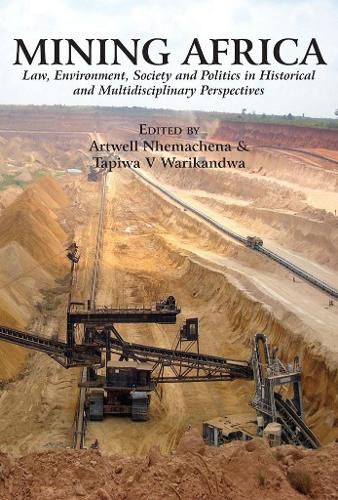Readings Newsletter
Become a Readings Member to make your shopping experience even easier.
Sign in or sign up for free!
You’re not far away from qualifying for FREE standard shipping within Australia
You’ve qualified for FREE standard shipping within Australia
The cart is loading…






This title is printed to order. This book may have been self-published. If so, we cannot guarantee the quality of the content. In the main most books will have gone through the editing process however some may not. We therefore suggest that you be aware of this before ordering this book. If in doubt check either the author or publisher’s details as we are unable to accept any returns unless they are faulty. Please contact us if you have any questions.
This book is a pacesetter in the study of mining and the environment in Africa from multidisciplinary and spatio-temporal perspectives. The book approaches mining from the perspectives of law, politics, archaeology, anthropology, African studies, geography, human ecology, sociology, history, economics and development. It interrogates mining and environment from the perspectives of customary law as well as from the perspectives of modern Euro-law. The book covers precolonial, colonial and postcolonial mining and environmental perspectives. It maintains a Pan-Africanist perspective that also speaks to contemporary debates on African Renaissance and to the unity of Africa. From scrutinising the lived realities of African miners who are often referred to as illegal miners, the book also interrogates transnational mining corporations; matters of corporate social responsibility as well as matters of tax evasion by transnational corporations whose accountability to African governments is questioned. With both theoretical chapters and chapters based on empirical studies of mining and the environment across the African continent, the book provides a much needed holistic, one stop shop for scholars, activists, researchers and policy makers who need a comprehensive treatise on African mining and the environment.
With both theoretical chapters and chapter based on empirical studies on mining and the environment across the African continent, the book provides a much needed holistic, one stop shop for scholars, activists, researchers and policy makers who need a comprehensive treatise on African mining and the environment. The book comes at the right time when matters of African mining and environment are increasingly coming to the fore in the light of discourses about the new 21st century scramble for African resources, in which big transnational corporations and nations are jostling to suck Africa dry in their race to control planetary resources. It is a book that speaks to contemporary broader issues of (de-)coloniality and transformation of African minds and African environmental resources.
$9.00 standard shipping within Australia
FREE standard shipping within Australia for orders over $100.00
Express & International shipping calculated at checkout
This title is printed to order. This book may have been self-published. If so, we cannot guarantee the quality of the content. In the main most books will have gone through the editing process however some may not. We therefore suggest that you be aware of this before ordering this book. If in doubt check either the author or publisher’s details as we are unable to accept any returns unless they are faulty. Please contact us if you have any questions.
This book is a pacesetter in the study of mining and the environment in Africa from multidisciplinary and spatio-temporal perspectives. The book approaches mining from the perspectives of law, politics, archaeology, anthropology, African studies, geography, human ecology, sociology, history, economics and development. It interrogates mining and environment from the perspectives of customary law as well as from the perspectives of modern Euro-law. The book covers precolonial, colonial and postcolonial mining and environmental perspectives. It maintains a Pan-Africanist perspective that also speaks to contemporary debates on African Renaissance and to the unity of Africa. From scrutinising the lived realities of African miners who are often referred to as illegal miners, the book also interrogates transnational mining corporations; matters of corporate social responsibility as well as matters of tax evasion by transnational corporations whose accountability to African governments is questioned. With both theoretical chapters and chapters based on empirical studies of mining and the environment across the African continent, the book provides a much needed holistic, one stop shop for scholars, activists, researchers and policy makers who need a comprehensive treatise on African mining and the environment.
With both theoretical chapters and chapter based on empirical studies on mining and the environment across the African continent, the book provides a much needed holistic, one stop shop for scholars, activists, researchers and policy makers who need a comprehensive treatise on African mining and the environment. The book comes at the right time when matters of African mining and environment are increasingly coming to the fore in the light of discourses about the new 21st century scramble for African resources, in which big transnational corporations and nations are jostling to suck Africa dry in their race to control planetary resources. It is a book that speaks to contemporary broader issues of (de-)coloniality and transformation of African minds and African environmental resources.